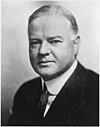1928 Republican Party presidential primaries
Appearance
This article relies largely or entirely on a single source. (May 2024) |
| |||||||||||||||||||||||||||||||||||||||||||||||
| |||||||||||||||||||||||||||||||||||||||||||||||
 First place finishes by preference primary results | |||||||||||||||||||||||||||||||||||||||||||||||
| |||||||||||||||||||||||||||||||||||||||||||||||
From March 6 to May 18, 1928, voters of the Republican Party chose its nominee for president in the 1928 United States presidential election. The nominee was selected through a series of primary elections and caucuses culminating in the 1928 Republican National Convention held from June 12 to June 15, 1928, in Kansas City, Missouri.[1]
Candidates
[edit]Nominee
[edit]| Candidate | Most recent position | Home state | Campaign | Popular vote | Contests won | Running mate | ||
|---|---|---|---|---|---|---|---|---|
| Herbert C. Hoover | 
|
U.S. Secretary of Commerce (1921–1928) |
 California |
(Campaign • Positions) Secured nomination: June 12, 1928 |
[data missing] | Charles Curtis | ||
Withdrew during convention
[edit]| Candidate | Most recent position | Home state | Campaign | Delegates on first ballot | Contests won | ||
|---|---|---|---|---|---|---|---|
| Frank O. Lowden | 
|
Governor of Illinois (1917–1921) |
Illinois |
Defeated at convention: June 12, 1928 |
— | [data missing] | |
| Charles Curtis | 
|
U.S. Senator from Kansas (1903–1913, 1915–1929) |
Kansas |
Defeated at convention: June 12, 1928 (nominated for vice president) |
— | [data missing] | |
| James E. Watson | 
|
U.S. Senator from Indiana (1916–1933) |
 Indiana |
Defeated at convention: June 12, 1928 |
— | [data missing] | |
| George W. Norris | 
|
U.S. Senator from Nebraska (1916–1943) |
Nebraska |
Defeated at convention: June 12, 1928 |
— | [data missing] | |
Did not run
[edit]- Former Secretary of State Charles Evans Hughes of New York
- Secretary of the Treasury Andrew Mellon of Pennsylvania
Favorite sons
[edit]The following candidates stood for nomination in their home states for the purpose of controlling their delegate slate at the convention. They did not receive the first-ballot support of delegates in more than two other states or territories.
- Senator Guy D. Goff of West Virginia
See also
[edit]References
[edit]- ^ Kalb, Deborah (2016-02-19). Guide to U.S. Elections - Google Books. CQ Press. ISBN 9781483380353. Retrieved 2016-02-19.





